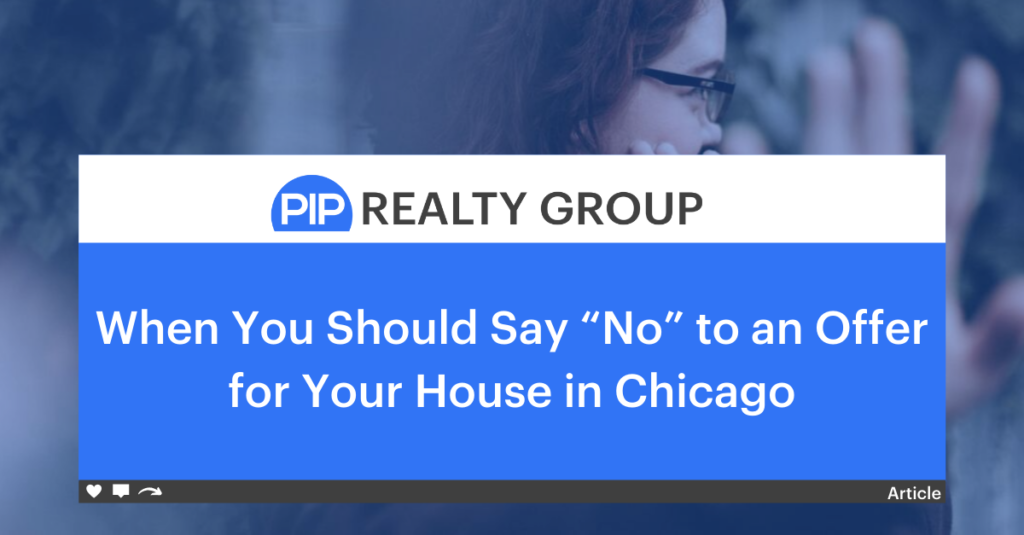
Selling a house seldom goes as smoothly as we’d like it to, especially when it comes to the offer. Not every offer for your house is right, and many should be rejected – even sometimes when the money figure is highly attractive. But it’s not always easy to know which offers should be rejected and which accepted, so it’s important to know the red flags and when to say “No.” Read on, then, to find out when to say “No” to an offer for your house in Chicago.
Offer and/or Earnest Money Too Low
Most of the time, when an offer for your house in Chicago is too low, you should say “No”(or make a counteroffer). “Sometimes buyers will throw out an offer below the asking price hoping you’ll accept it. If the amount is too low for you to consider or if your home has just entered the market, you may reject the offer.”
Another reason to reject an offer is when the earnest money deposit is too low – the upfront deposit to lock in the offer and demonstrate buyer seriousness. If the earnest money is too low, that’s an indication that a buyer really doesn’t have any skin in the game. Earnest money “is a sign a buyer is serious, and the amount can be a flat rate or up to 5 percent of the asking price. If your home is in a competitive market, you may decide to turn down an earnest money offer that is too low or nonexistent.”
There can be, however, other mitigating conditions in an offer that more than offset a low offer or low earnest money. So before saying “No” to an offer for your house, be sure to consult your Chicago agent at 773.233.8180.
Buyer Not Pre-Approved
Of course, cash is king when it comes to an offer for your house, but few non-investor buyers have the funds on hand to pay cash for a house. There is, though, a second-best option that provides nearly the same security as a cash offer. And that is when a buyer has been pre-approved by her mortgage lender.
Pre-approval means that a buyer has met the conditions to get a mortgage loan within “a set price range and has been pre-approved for the loan. In essence, the pre-approval letter turns [a buyer] into a virtual cash buyer, as mortgages can be harder to come by these days.”
But if a buyer isn’t pre-approved, you may be taking a big risk if you accept her offer. You’ll have to take your house off the market, and the buyer’s financing may still fall through, which means going through the whole marketing process again. Usually, it’s best to reject an offer for your house if the buyer isn’t pre-approved.
Too Many or the Wrong Kind of Contingencies
And then there are those worrisome contingencies. In most cases, you should say “No” to an offer for your house in Chicago if there are too many contingencies or a specific kind of contingency.
“Contingencies are conditions that must be met for a sale of a home to be completed. Common contingencies may include completing a home inspection, allowing the buyer’s home to sell first, and a review of any HOAdocumentation. However, if a buyer has numerous contingencies and it feels excessive, you can reject the offer.”
A sale contingency alone is often a good reason to reject an offer. A sale contingency stipulates that closing is contingent on the buyer’s selling her current home, and if that doesn’t happen, according to the sale contingency clause, the offer can be retracted.
Be sure then to ask the buyer to remove the sale contingency in the offer for your house. “If your buyer is reluctant to make that deal, it means they aren’t willing to take a risk that their home won’t sell, so why should you? In this case, it may be time to decline the offer altogether.”
Difficulty Agreeing on a Closing Date
After you receive an offer for your house, the next sticking point is usually the closing date. The closing period is typically somewhere between 30 to 60 days. As a seller, you’ll want to close as soon as possible, so the 30-day period is the most attractive closing option.
Buyers, though, often want a longer closing period to get everything in order, especially finances. “It can be tough for two individual parties to come together and agree on a closing date [because]everyone’s needs are different. If a buyer’s timeline doesn’t match up with your needs, you can pass on their offer.” So if a buyer remains intransigent on the closing date, you’re probably better off saying “No” to the offer.
A Better Offer
Then, of course, you may receive a better offer for your house in [marker_city], in which case you should decline the prior one. Current market conditions – low inventory, rising home prices, and high demand – are in your favor here.
Just be aware that a better offer doesn’t necessarily mean a higher offer (although it often does). Fewer contingencies and more closing flexibility can make an offer better even though the dollar figure remains the same. So, again, be sure to consult your Chicago before turning down an offer for another one that appears to be better.
Lean on Your Chicago Agent
There are, then, several good reasons for saying “No” to an offer. The difficulty, though, lies in knowing whether that’s really the right move because you could be shooting yourself in the foot. But that’s where your Chicago agent can provide invaluable assistance. If you don’t want to make a costly mistake in accepting or rejecting an offer for your house in Chicago, be sure to contact us today at 773.233.8180.
